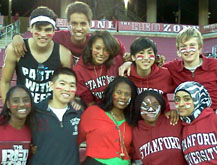 |
Kovsie students Foster Lubbe (far right at the back) and Palesa Mafisa (middle front) interacting with students from Stanford University.
14 September 2012 |
The six students, Elri Marais, Palesa Mafisa, Goodwill Shelile, Foster Lubbe, Gabriella Schroder and Saheed Abdullah, are part of the Stanford Sophomore College Programme, a residential summer programme for second-year students. They have been at Stanford since the beginning of this month, engaging in intense academic exploration with peers and professors on a variety of innovative, multidisciplinary topics.
Writing about his experiences in San Francisco, Foster Lubbe said it has been a wonderful experience thus far. “The classes are very interactive. It is amazing to see how effectively students and lecturers make use of technological tools, especially the speedy Internet, during class,” he wrote.
Foster and Palesa have been doing a course on “Mixed Race in the New Millennium, Elri and Abdullah on, “The Meaning of Life, and Gabriella and Goodwill a course on “Ghost stories”. Highlights for the students have been a discussion with New York Times journalist, Susan Saulny, a visit to the Stanford Centre of Marine Biology and for Gabriella and Goodwill a San Francisco ghost tour.